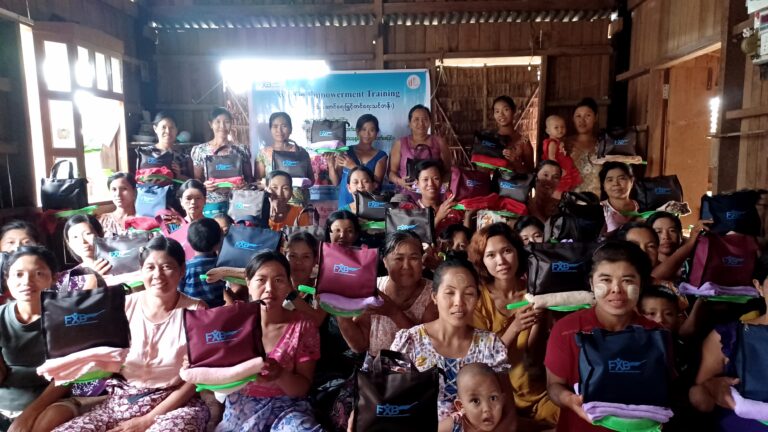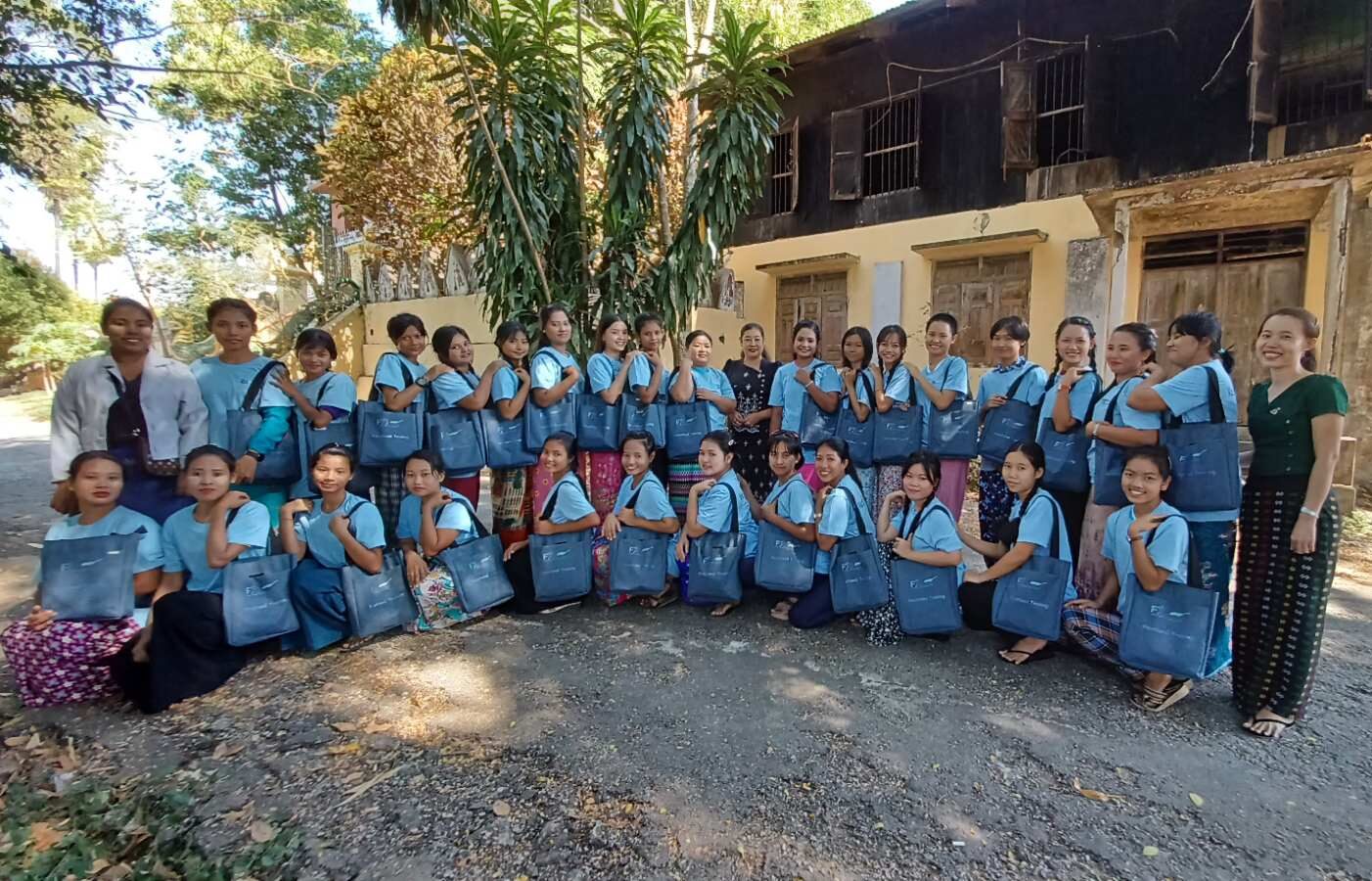
Myanmar : Soutenir les populations marginalisées face aux défis sociaux et sanitaires
Depuis 1992, FXB Suisse œuvre activement pour le développement durable et l’amélioration des conditions de vie des communautés les plus vulnérables au Myanmar, où elle est enregistrée en tant qu’organisation non gouvernementale internationale.
Contexte
Ce pays souffre de conflits politiques récurrents depuis son indépendance en 1948. En 2021, une nouvelle crise a éclaté, avec le retour des militaires au pouvoir, mettant un terme à une petite décennie de transition vers la démocratie. Ces dernières années ont été traumatisantes pour les habitants du Myanmar, caractérisées par des niveaux de souffrance humaine sans précédent.
Bon nombre des progrès impressionnants réalisés par le pays en matière de développement au cours des 15 dernières années sont aujourd’hui en passe d’être anéantis. L’instabilité politique a intensifié les conflits armés entre la junte militaire et les différents groupes ethniques armés. Désormais, près de la moitié de la population vit sous le seuil de la pauvreté.
Notre action au Myanmar
1. Les Cliniques flottantes FXB : Permettre aux populations vivant le long du fleuve de l’Irrawaddy d’accéder à des soins de santé adéquats.
Pour garantir l’accès à des soins de santé et de prévention adéquats aux populations isolées vivant le long du fleuve Irrawaddy, deux bateaux de croisière ont été transformés en cliniques flottantes. Chacune est équipée d’une salle de consultation, d’une pharmacie, ainsi que d’un espace pour effectuer des petites interventions chirurgicales, des consultations gynécologiques ou des soins dentaires et ophtalmologiques. Des formations sont aussi dispensées en matière de prévention de la santé et de violences basées sur le genre.
Plus de 50 000 services sont dispensés chaque année, améliorant significativement l’accessibilité aux soins de santé et aux actions de prévention, et couvrant plus de 40 % des habitants du bassin desservi. Pour faire face à l’effondrement du système de santé et maximiser l’impact du projet, 400 agents de santé communautaires ont déjà été formés. Ils jouent un rôle essentiel en dispensant les premiers secours, en assurant les soins néonatals à domicile et en renforçant les connaissances des communautés en matière de santé, y compris la santé sexuelle et reproductive ainsi que la prévention des violences basées sur le genre.
2. Aider les jeunes à acquérir des compétences et faciliter leur entrée dans le monde du travail
Chaque année, ce sont 250 jeunes qui sont formés grâce au programme de formation professionnelle, à la fois au sein du Centre FXB de Formation Professionnelle de Yangon et à travers les Unités Itinérantes de Formation Professionnelle, qui permettent d’atteindre des jeunes et des personnes déplacées vivant dans des régions sans accès à ces services.
Le programme propose différentes formations, d’une durée allant jusqu’à 24 mois, dans divers domaines tels que la confection, la décoration intérieure, le tissage, le travail du bois et du métal, ainsi que l’hôtellerie. Le Centre FXB de Yangon accueille également, chaque jour, une trentaine d’enfants vulnérables ayant abandonné l’école, leur offrant une éducation informelle adaptée à leurs besoins.
Tous nos apprenti.e.s reçoivent des formations pratiques et théoriques ainsi que des enseignements visant à renforcer leurs compétences quotidiennes et leur estime de soi. Les diplômé.e.s sont accompagné.e.s à chaque étape de leur recherche d’emploi jusqu’à l’obtention d’un contrat de travail digne. Ceux et celles qui s’orientent vers l’auto-emploi bénéficient d’un soutien financier pour lancer leur microentreprise, ainsi que d’un mentorat jusqu’à la réussite de leur projet.
Notre showroom, situé en ville de Yangon, propose une collection variée de meubles, lampes, tissus, tapis, rideaux, stylos écologiques, vêtements et jouets. Il s’adresse à une clientèle locale, mais aussi aux expatriés, aux hôtels, aux entreprises et aux touristes de passage. Ces articles de grande qualité sont réalisés par une quinzaine de diplômé.e.s FXB.
3. Protéger les Femmes et les Filles d'abord
FXB promeut l’accès aux services de santé sexuelle et reproductive (SSR) et droits y afférents, tout en œuvrant pour l’élimination des violences faites aux femmes et aux filles dans plusieurs États. Elle gère également des maisons d’accueil pour les survivantes de violences basées sur le genre, dans un contexte où la discrimination profondément enracinée perpétue une culture d’impunité et de tolérance face aux violations des droits des femmes.
Ces actions sont intégrées de manière transversale dans les autres projets de FXB, notamment à travers les cliniques flottantes, les Villages FXB et les programmes de formation professionnelle, afin d’assurer une approche holistique et durable.
4. VIH/Sida : Réduire le nombre de nouvelles infections
A travers notre projet Sunday Empowerment Group (SEG), une approche combinée d’interventions est mise en place auprès des travailleuses du sexe et d’autres populations clés. Celle-ci vise à améliorer l’accès aux services de dépistage du VIH, à garantir une prise en charge efficace grâce à l’accès à la thérapie antirétrovirale et à assurer la continuité des soins.
Un soutien psychosocial est également proposé aux personnes vivant avec le VIH afin de renforcer leur résilience et de leur permettre de mener une vie épanouie malgré les défis liés à la maladie. L’amélioration des résultats sanitaires repose notamment sur une meilleure orientation vers le programme national de lutte contre le sida, garantissant ainsi un suivi médical adapté et durable
5. Lutter contre les causes multidimensionnelles de la pauvreté : 4 projets de développement économique et communautaire VillageFXB
Le modèle VillageFXB a été mis en œuvre dans les Etats Mon et Kayin dès 2017. Ce sont ainsi plus de 2’500 adultes et enfants qui ont reçu un soutien dégressif sur trois ans : le temps nécessaire pour transiter d’une situation de pauvreté extrême à une autonomie économique et sociale durable. Par ailleurs, ces projets ont impacté près 40 000 membres des communautés.
Les familles bénéficiaires, après avoir suivi des formations en finances et en gestion de projet, ont reçu un capital de départ pour créer des activités génératrices de revenus (microentreprises) et participent activement à des Associations Villageoises d’Épargne et de Crédit (AVEC). Elles ont bénéficié également d’une aide alimentaire au début du projet, leur permettant de retrouver un état de santé satisfaisant. Cela leur a donné l’énergie nécessaire pour s’investir pleinement dans leurs activités économiques, tandis que leurs enfants peuvent mieux poursuivre leur scolarité.
Tout au long des trois années, un accompagnement global a été assuré : soutien à la scolarisation et formation professionnelle des enfants et des jeunes, accès à des soins de santé adéquats et amélioration de leurs conditions de logement et des infrastructures sanitaires. Elles ont eu l’opportunité d’acquérir des compétences clés en matière de santé et de questions sociales, favorisant ainsi leur développement global et garantissant la pérennité des impacts du projet sur leur qualité de vie.
FXB a également intégré la résilience et l’adaptation aux impacts du changement climatique dans ses activités, en veillant à préparer les communautés marginalisées à faire face aux défis environnementaux qui les affectent de manière disproportionnée.
L’égalité entre les femmes et les hommes n’est pas seulement un droit humain fondamental, c’est aussi une condition de possibilité d’un monde prospère et durable. Ainsi, une attention particulière est portée à l’autonomisation économique des femmes et à la promotion de leur leadership. Parce que les femmes jouent un rôle clé dans le développement de leurs communautés, FXB met en place des activités spécifiques pour renforcer leurs compétences, favoriser leur accès à des opportunités économiques durables et valoriser leur rôle en tant qu’actrices de changement, notamment en encourageant leur participation active à la prise de décision au sein de leurs familles et de leurs communautés. Il s’agit aussi de sensibiliser les communautés aux violences domestiques et sexuelles, à l’égalité des genres et à la santé sexuelle et reproductive et droits y afférents.
FXB souhaite répliquer ce modèle dans d’autres États du Myanmar où les défis socio-économiques sont similaires, afin de maximiser son impact positif à grande échelle et de favoriser des changements durables pour les communautés vulnérables. Ce modèle présente plusieurs avantages stratégiques:
- Il est relativement simple à mettre en œuvre, même dans des contextes complexes.
- Il est économiquement viable, car son coût est raisonnable par rapport aux impacts obtenus.
- Il renforce la résilience des communautés, en combinant des interventions adaptées aux réalités locales.
Notre impact au Myanmar
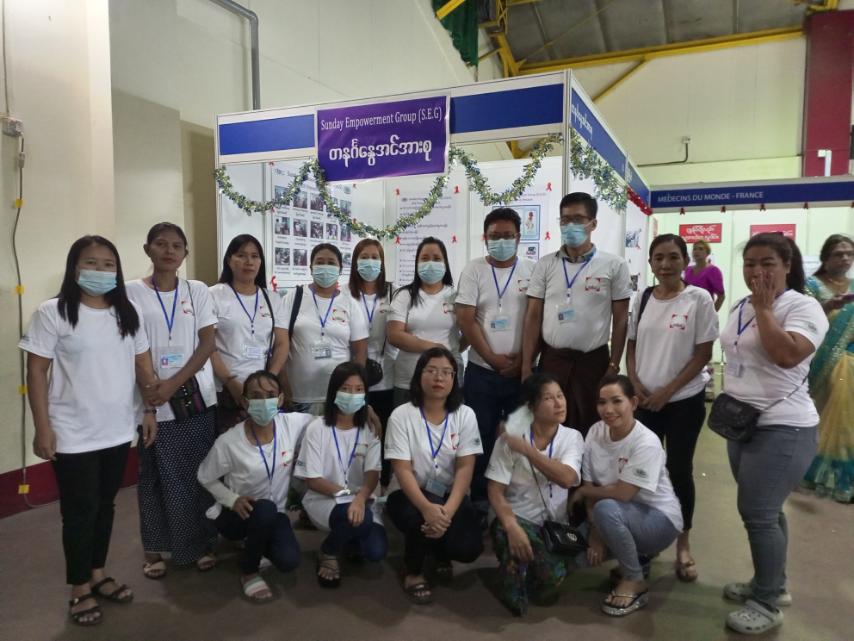
ont été impactés par nos programmes depuis 1993.
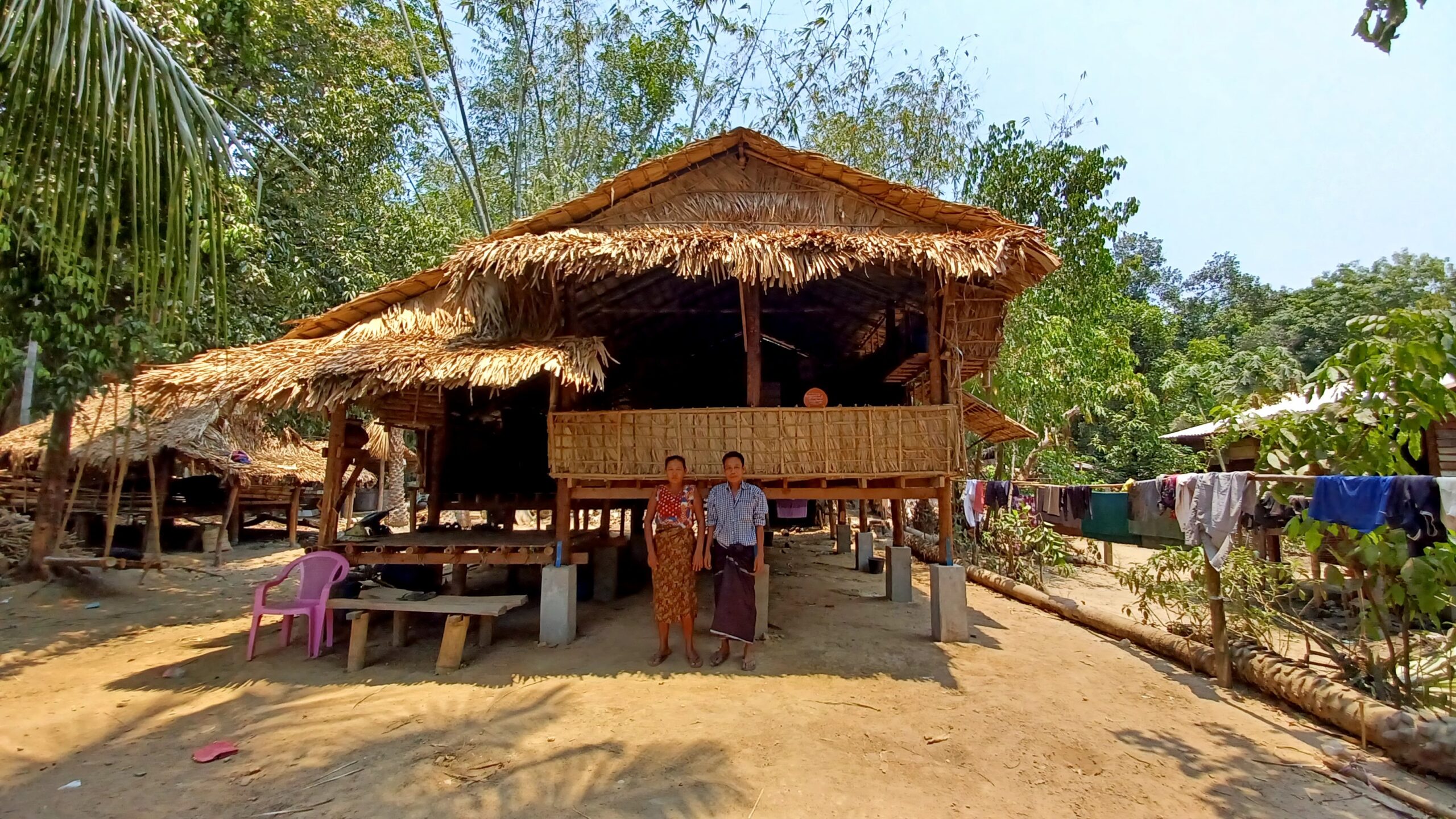
ont reçu un soutien dégressif sur trois ans depuis 2017 à travers le modèle VillageFXB.

sont formés chaque année grâce au programme de formation professionnelle, tant au sein du Centre FXB de Formation Professionnelle de Yangon et à travers les Unités Itinérantes de Formation Professionnelle,
Les efforts de développement économique et communautaire du modèle VillageFXB, associés à l’amélioration de l’accès à la santé, à l’éducation et à la formation professionnelle, visent à renforcer le tissu économique et social des communautés les plus vulnérables.
En parallèle, nos actions de sensibilisation sur des enjeux clés tels que le VIH, la traite des êtres humains, les violences basées sur le genre, la santé sexuelle et reproductive, ainsi que les droits associés, ont eu un impact significatif sur de nombreuses vies.
FXB a également réagi de manière agile aux urgences humanitaires, en menant des opérations de reconstruction après des catastrophes naturelles comme le cyclone Nargis et d’autres inondations majeures.
Cette approche globale, alliant programmes de développement à long terme et secours d’urgence démontre l’engagement de FXB à fournir un soutien holistique et durable aux communautés du Myanmar.
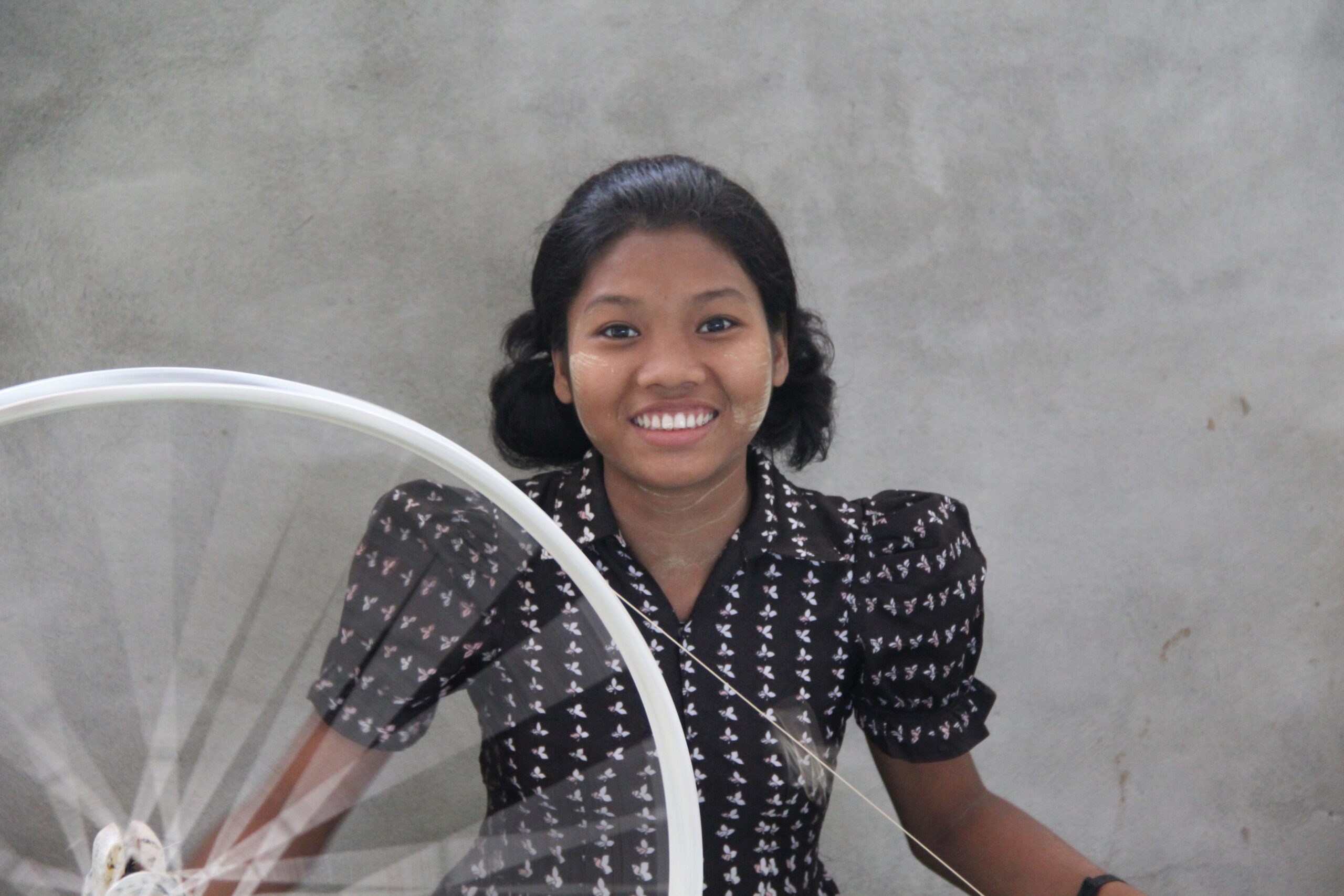
Parcours de vie
Moet Moet a dû quitter l’école au niveau primaire pour soutenir sa famille. Malgré son manque d’instruction, elle a pu suivre une formation en couture de 24 mois au Centre FXB de Yangon. Grâce à sa grande volonté et au soutien de FXB, elle a ouvert son propre atelier de couture après l’obtention de son diplôme il y a deux ans. Aujourd’hui, elle génère un revenu net d’environ 100 $ par mois, lui permettant de subvenir à ses besoins et d’aider sa famille.
“Au-delà des compétences techniques, j’ai appris à me faire confiance et à croire en l’avenir. Cette formation m’a donné une vraie force intérieure et une vision plus sereine de ma vie.”

